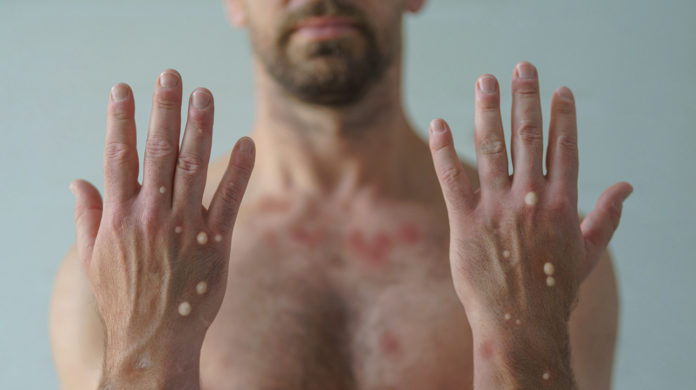Provided by PPHD
Pasadena Public Health Department (PPHD) has received reports of the first cases of monkeypox infection in four (4) Pasadena residents. All cases being reported have been confirmed by PPHD to meet the Centers for Disease Control and Prevention (CDC) definition for either a probable or confirmed case. Monkeypox generally spreads through prolonged skin-to-skin contact. Contact includes prolonged intimate interactions, and sharing of infected bedding or clothing. If you have sex or intimate physical contact with many people, risk of contracting monkeypox is higher.
The individuals are adults and are recovering with monitoring and support from PPHD. To maintain patient confidentiality, no other details on these individuals will be shared. PPHD is following up directly with those who have had close contact with these individuals and may be at risk for infection. Close contacts are informed on how to assess and monitor for signs and symptoms of illness, and are considered for post-exposure prophylaxis with vaccination.
“We have been coordinating with our healthcare partners who are managing cases of monkeypox infections,” said PPHD Director and Health Officer Dr. Ying-Ying Goh. “We will are recommending individual and community mitigation measures to reduce the risk of spread of the monkeypox virus, and we will continue to provide vaccination to eligible populations as quickly as we receive federally-supplied vaccine.”
Monkeypox is a viral infection that can spread through contact with body fluids, monkeypox sores, or shared items (such as clothing and bedding) that have been contaminated with fluids from sores of a person with monkeypox. Although monkeypox is not generally considered a sexually transmitted infection, it can be transmitted during sex through skin-to-skin and other intimate contact, regardless of gender or sexual orientation. Individuals with monkeypox may spread the virus through:
- Respiratory secretions through prolonged face-to-face interactions (the type that mainly happen when living with someone or caring for someone who has monkeypox);
- Direct skin-to-skin contact with rash lesions or infectious sores/scabs;
- Sexual/intimate contact, including kissing, hugging, massaging and cuddling;
- Living in a house and sharing a bed with someone; and
- Sharing towels or unwashed clothing.
People with monkeypox sometimes develop a flu-like illness with fever, fatigue, and enlarged lymph nodes followed by a rash. In other instances, people just develop a rash which can occur on the genitals or other areas of the body. People usually develop monkeypox 7 to 14 days (and up to 21 days) after being exposed.
Most people with monkeypox have a mild illness that improves without treatment over 2 to 4 weeks. Treatment is supportive and focused on easing the symptoms of the illness. Monkeypox is contagious and spreads easily to others until scabs have fallen off and a new layer of skin has formed. Monkeypox is NOT spread through casual brief conversations or walking by someone (like in a grocery store).
To prevent the spread of monkeypox, PPHD recommends:
- Avoiding close physical contact with people who have symptoms, including sores or rashes;
- Talking to your sexual partner(s) about any recent illness and being aware of new or unexplained sores or rashes;
- Avoiding contact with contaminated materials;
- Wearing personal protective equipment (i.e., mask, gloves, gown) if you cannot avoid close contact with someone who has symptoms;
- Practicing good hand hygiene;
- Speaking to your healthcare provider about getting tested if you have symptoms; and
- Staying in isolation until you are no longer considered infectious per public health guidance.
Public Health or clinic partners will directly communicate to eligible individuals to provide details on how and where to access the JYNNEOS vaccine. PPHD is providing monkeypox vaccines by invitation only to the following select groups of persons identified through public health investigation, including:
- Persons confirmed by Public Health to have had high- or intermediate-risk contact with someone with monkeypox, as defined by CDC.
- Persons who attended an event/venue where there was high risk of exposure to an individual(s) with confirmed monkeypox virus through skin-to-skin or sexual contact. Public Health will work with event/venue organizers to identify persons who may have been present and at risk of exposure while at the venue.
- Gay or bisexual men and transgender persons 18 years and older who:
- Were diagnosed with gonorrhea or early syphilis within the past 12 months; or
- Are on HIV pre-exposure prophylaxis (PrEP); or
- Attended or worked at a commercial sex venue or other venue where they had anonymous sex or sex with multiple partners (e.g., saunas, bathhouses, sex clubs, sex parties) within past 21 days; or
- Had multiple or anonymous sex partners in the last 14 days including engaging in survival and/or transactional sex (e.g., sex in exchange for shelter, food and other goods and needs).















.png)







